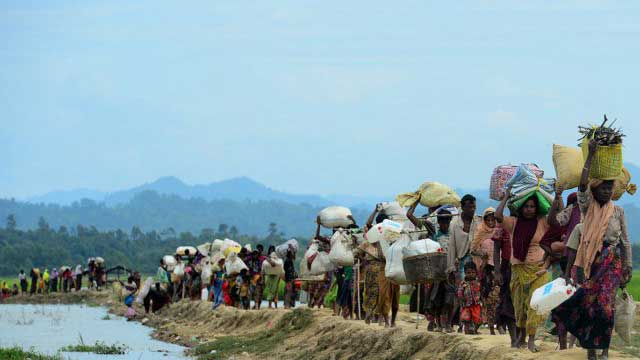Despite all the preparations, no Rohingya turned up on Thursday to avail of the “voluntary” repatriation offer given to them to go back to their place of origin in Rakhine State of Myanmar prompting the authorities to suspend the repatriation process for the day.
While briefing reporters, Refugee Relief and Repatriation Commissioner Mohammad Abul Kalam said they interviewed the listed Rohingyas over the last couple of days and encouraged them to return to their homeland.
But nobody did show up at Ghumdhum transit point on Thursday, he said adding that five buses were kept ready to take the Rohingyas to Myanmar’s Rakhine State, their place of origin.
A total of 235 Rohingya families were supposed to be formally repatriated in the first batch.
Rohingyas said they are mainly demanding four things before their repatriation -- citizenship, safety and security after their return, returning their homes and land and seeking justice for the crimes committed against them.
Bangladesh is now hosting over 1.1 million Rohingyas and most of them entered the country since August 25, 2017. The two countries signed a repatriation deal on November 23, 2017, but there has been little progress.
On July 29, Bangladesh handed a fresh list of 25,000 Rohingyas from around 6,000 families to Myanmar for verification before their repatriation to Rakhine State.
With the latest list, Bangladesh has so far handed the names of around 55,000 Rohingyas to the Myanmar authorities and around 8,000 of them have been verified. Myanmar only cleared 3,450 Rohingyas for beginning the repatriation.
On January 16, 2018 Bangladesh and Myanmar inked a document on “Physical Arrangement”, which was supposed to facilitate the return of Rohingyas to their homeland.
The “Physical Arrangement” stipulates that the repatriation will be completed preferably within two years from the start.
The first batch of Rohingyas was scheduled to return on November 15 last year but it was halted amid the unwillingness of Rohingyas to go back for lack of a congenial environment in Rakhine.
On August 20, Foreign Minister Dr AK Abdul Momen said both Bangladesh and Myanmar were“fully ready” to resume the repatriation of Rohingyas to their homeland but some Rohingya leaders and NGOs are reportedly discouraging them to return.
“We’ve heard some Rohingya leaders emerged there. They don’t want the return of any Rohingya (to their homeland). They’re trying to stop returnees. Some INGOs and NGOs are instigating them (Rohingyas),” he told a small group of reporters at his office.
He said Bangladesh wants to see Rohingyas’ return to Rakhine State as soon as possible. The two countries are trying to resume the repatriation in a small scale from Thursday.
Dr Momen said Myanmar only cleared 3,450 Rohingyas for beginning repatriation. “We want them to go back as soon as possible.”
Earlier, Bangladesh discussed the Rohingya repatriation issue with visiting Indian External Affairs Minister Dr S Jaishankar at a bilateral meeting.
On Rohingya issue, Jaishankar said they agreed that the “safe, speedy and sustainable” return of Rohingyas to their place of origin in Rakhine is in the national interest of the three countries -- Bangladesh, Myanmar and India.
“We reaffirmed our readiness to provide more assistance for the displaced persons in Bangladesh and to improve socioeconomic condition in Rakhine State,” he said.





